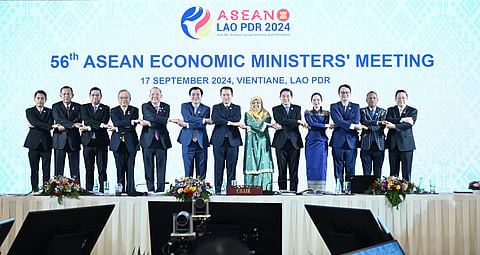
- NEWS
- the EDIT
- COMMENTARY
- BUSINESS
- LIFE
- SHOW
- ACTION
- GLOBAL GOALS
- SNAPS
- DYARYO TIRADA
- MORE

The government has maintained its call for its Association of Southeast Asian Nations (ASEAN) peers to work together to avoid actions that increase burdens and costs for consumers and businesses, particularly micro, small and medium enterprises aired in the opening of the 56th ASEAN Economic Ministers Meeting and Related Meetings in Vientiane, Lao People’s Democratic Republic.
Trade and Industry Undersecretary Ceferino Rodolfo, acting Trade and Industry Secretary Cristina Roque, during discussions on the ASEAN Free Trade Area, separately urged ASEAN member states to uphold commitments to the ASEAN Trade in Goods Agreement.
Rodolfo also emphasized the critical need to eliminate barriers to Philippine export products to facilitate smoother trade flows across the region.
On ASEAN’s trade facilitation work, Rodolfo highlighted the successful launch of the Philippines’ full issuance and acceptance of e-Form D at the beginning of the year.
Paperless transactions advocated
The Philippines fully complies with the paperless transaction, following Customs Memorandum Circular (CMC) 212-2023 released by the Bureau of Customs (BoC) which started implementing the full issuance and acceptance of ATIGA Electronic Certificate of Origin (eCo) Form D by the start of the year, 2024.
All exporters are advised to create an account in the eCO portal.
Meanwhile, Rodolfo underscored this as a significant milestone in the country’s ongoing efforts to streamline and enhance our customs processes.
Furthermore, during the discussion on the ongoing review of the ATIGA, the undersecretary pushed for the retention of Special Consideration for rice and sugar.
“The Philippines is not requesting its retention as a trade restrictive instrument but rather to uphold our commitment to our stakeholders that their concerns and sensitivities are addressed accordingly,” he explained.
For his part, Lao PDR Minister of Industry and Commerce Malaithoing Kommasith stressed the importance of regional cooperation in navigating the current economic challenges.
He also highlighted ASEAN’s role in promoting economic resilience and sustainable growth throughout the region.
As the discussions conclude this week, economic ministers have explored strategies to enhance regional economic integration, advance trade and investment strategies, address key economic growth challenges and strengthen cooperation between ASEAN countries and their dialogue partners.
